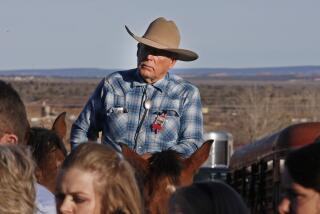Long arm of science helps the law lasso cattle thieves
- Share via
TUCSON, ARIZ. — During Arizona’s territorial days and probably even into statehood, cattle rustling was a hanging offense.
That’s no longer the case, but a southern Arizona rancher could be facing fines and prison time if convicted of rustling-related charges lodged against him -- as a result of DNA testing.
At an arraignment Jan. 16, Larry Hubbard was ordered to stand trial June 25 in Cochise County Superior Court. Hubbard was indicted on one misdemeanor and five felony rustling-related counts, authorities said.
The felony charges allege that Hubbard branded two yearling bulls, attempted to sell livestock and controlled property belonging to another rancher -- two calves, two yearlings and a pregnant cow, worth more than $4,000. The misdemeanor accuses him of having “knowingly slaughtered, sold, purchased, transported or shipped” livestock without inspection.
DNA samples tested by the Veterinary Genetics Laboratory at UC Davis established that the calves and yearlings were born to cows tagged and branded as belonging to a neighboring rancher, Doug Kuhn.
“I think if this had happened 50 years ago, he would already have been hung or shot,” Kuhn said.
Hubbard’s attorney, Perry Hicks, disputes that his client did anything wrong.
“Simply because the parentage of the cattle turned out to belong to the alleged victim doesn’t mean that my client’s guilty of cattle rustling,” Hicks said.
Rustling isn’t common in Arizona but it’s not unheard of.
Ed Hermes, a spokesman for the Arizona Department of Agriculture, said there were five cases of cattle theft in the state in 2006. The yearly average, he said, is between six and 12.
Cattle rustling has rebounded in Texas, Oklahoma and Missouri, with cases also reported in Arkansas and California. DNA testing has become crucial in enabling investigators to solve some of the thefts.
Three years ago, prosecutors in Tulare County, Calif., used DNA testing to help convict a rancher accused of altering brands and documents to keep cows that allegedly had wandered onto his property.
The executive director of the Texas and Southwestern Cattle Raisers Assn. estimates that his agency solves four to five rustling cases a year in Texas and Oklahoma using DNA.
Scott Williamson, a special investigator for the association, cited one Oklahoma case solved about two years ago by tracing a stolen calf through nine hairs found in the truck that had transported the animal.
Another case used DNA comparisons of a piece of ear cut out and left in a cattle chute to track a calf whose earmark a thief had tried to alter.
Kuhn, whose family has ranched about 60 miles east of Tucson since 1920, said Hubbard called him last February to say he believed three of Kuhn’s red cows had found their way onto one of Hubbard’s pastures.
“A couple of the cows had been nursed earlier in the day and I questioned him about the calves and he denied he had any calves,” Kuhn said. “I went looking the next day and found two calves that belonged to two of the cows that he brought back.”
“Then I also discovered that he had another black cow of mine plus an additional two yearling bulls.”
That’s when Kuhn asked state livestock inspector Cathie Shelton to see that the cattle were impounded so that DNA samples could be tested to determine whether the calves and yearlings were offspring of Kuhn’s cows.
Deputy Cochise County Attorney Cameron Udall said conviction on the felony counts could bring sentences of up to 3 1/2 years, 2 1/2 years and one year, as well as fines of up to three times the value of the cattle.
More to Read
Sign up for Essential California
The most important California stories and recommendations in your inbox every morning.
You may occasionally receive promotional content from the Los Angeles Times.












